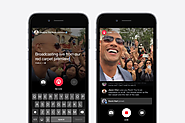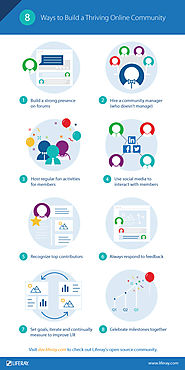-
About
- About Listly
- Community & Support
- Howto
- Chrome Extension
- Bookmarklet
- WordPress Plugin
- Listly Premium
- Privacy
- Terms
- DMCA Copyright
- © 2010-2025 Boomy Labs

 Steve Robinson
Steve Robinson
Listly by Steve Robinson

The competition is enormous -- and so is the level of noise you have to get over just to be seen and heard by potential customers.

More specifically, what habits make an effective social media manager? What do the best social media managers practice every day that makes them amazing at what they do? There seems to be a lot of good advice out there about the best social media tactics used by marketers-tactics that might work great right away but are often not sustainable.

Every day, athletes, musicians, politicians and other influencers use Facebook Mentions to share and connect with their fans, and more than 900 million people are connected to public figures on Facebook. Today, we're excited to introduce Live, a new way for public figures to share live video from Mentions with their fans on Facebook.

It's no secret that multiple mediums have given consumers vast amount of choices-and no one has been able yet to discover more minutes in the day. It's no secret that competition in a soft economy is stiffer than a Pan Galactic Gargle Blaster with Red Bull (for those of you familiar with The Hitchhiker's Guide to the Galaxy).

Content marketing is selling. To be more precise, according to the Content Marketing Institute: Content marketing is a marketing technique of creating and distributing valuable, relevant and consistent content to attract and acquire a clearly defined audience - with the objective of driving profitable customer action. A marketing technique .

Storytelling is a big word for something that can be either really simple, or really complex. What is undisputed, however, is the fact that storytelling and content marketing go together like peanut butter and jelly on a slice of toast.

Facebook already defines "the Web" for many people. Now it's looking to devour Web publishing entirely. This could be a very bad thing, but I'm hoping it will just drive publishers to develop faster-loading and more readable sites.

The 2015 Digital Trends Briefing, produced by Econsultancy in partnership with Adobe, highlights the key digital trends, challenges and opportunities which marketers need to be aware of during 2015, covering topics ranging from customer experience and mobile to cross-channel marketing and personalisation.

Communities are essential to shaping our identities. They bring people together through a common activity or belief and provide us a context in which we are able to interpret ourselves and one another. Take a sporting event, for example. Two strangers sitting next to each other can be wearing the same blue jerseys and rooting for the same team to win.

Marketers have long used social media to promote content. They'll throw a white paper up on their website, blast a few promotions touting the paper to their Twitter, Facebook, and LinkedIn followers, and, with any luck, people will like, retweet, favorite, and otherwise amplify the message. Think bullhorn.

If you're still holding on to old SEO practices, it may be time to rethink your strategy. Especially in light of the rapidly evolving Search Engine Optimization landscape with constant updates to algorithms such as March of The Penguin 2.1, Meet Google Hummingbird, and most recently Your Website Could Go Ghost On Google After April 21st.

Social media is a fresh avenue for advertising and marketing professionals. Unlike traditional advertising and more established forms of online marketing, experts in the social field haven't been around long enough to create solid a formula for accomplishing goals and achieving scalable ROI.

In all the talk about the mismatch between the projected number of STEM jobs ( 1.2 million new ones in the next six years) and the U.S.-based talent to fill those positions, we're losing sight of another big skills gap that's right under our fingers every day.

Dark Social Definition - Dark social is a term coined by Alexis C. Madrigal, a senior editor at The Atlantic, to refer to the social sharing of...

Rumors have been circulating for some time. The warning signs have been there, showing us the way. And, as of last week, the news is official: Google wants you to mobile-ize your website. So much so, in fact, that the search engine giant will be updating its algorithm (again) to increase rankings for mobile-friendly sites.

At our core, marketers are storytellers. We love to tell stories that evoke emotion and pull at heartstrings. As I have shared my vision of the next era of marketing, I've talked about how marketing is changing. But, in this post let's start with how it's not changing when it comes to building a brand.

The inexorable shift in the marketing function to digital is a largely consumer-driven phenomenon, as digital technologies like the Internet, social media, and mobile devices have empowered consumers to demand more out of brands and marketers. For today's tech-savvy consumers, simplicity, convenience, and highly personalized omnichannel experiences are root expectations.

Seth Godin is the godfather of modern marketing-or, at least, the type of modern marketing we all want to be doing. In 1999, Godin published Permission Marketing, and, in every way, it was a revelation.

If you're in the public relations and marketing world, you're probably familiar with Seth Godin. He's an entrepreneur (founder of Yoyodyne and Squidoo) and author, and his blog is a must-read for industry pros. Godin also coined the term " permission marketing"-the idea that brands can more effectively engage consumers by asking for their permission, not by barraging them with marketing messages.

According to the Salesforce 2015 State of Marketing report, marketers are changing their digital marketing priorities for 2015. While last year marketers scattered their attention across multiple disciplines, this year marketers are focusing on social and mobile channels. The report surveyed over 5,000 marketers about their budgets, metrics and strategies for 2015.
